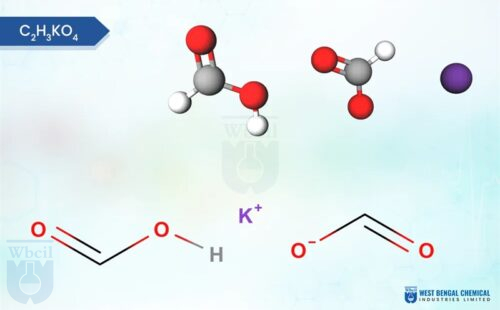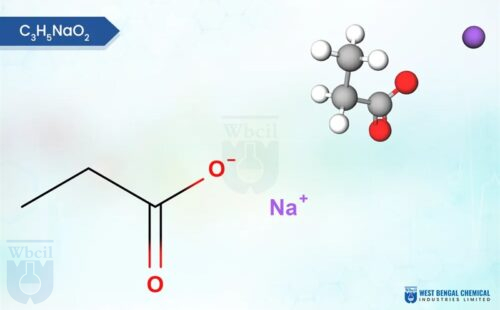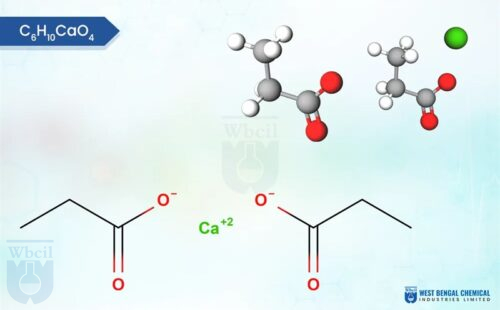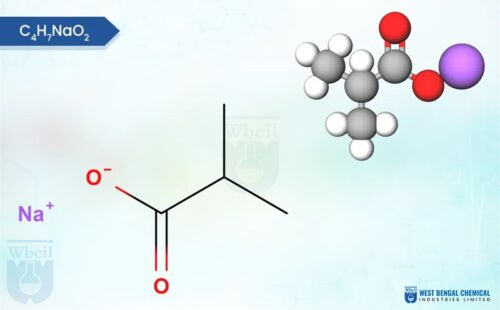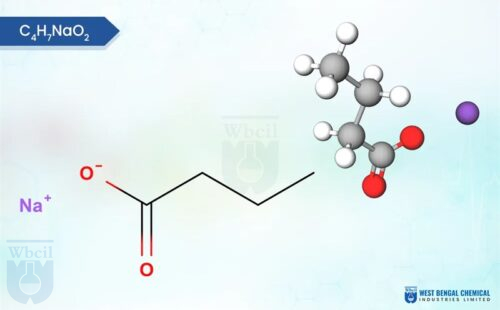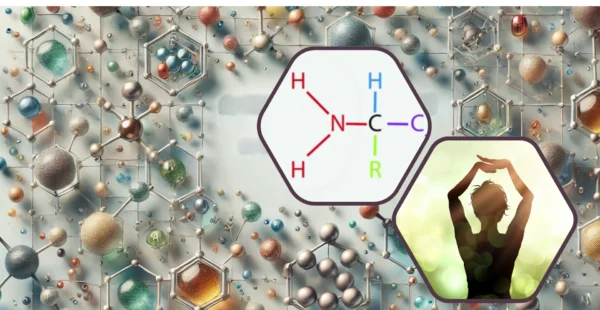Ammonium Propionate
-
Product Name:
Ammonium Propionate
-
Molecular Formula:
C3H9NO2
-
Molecular Weight:
91.11 g/mol
-
CAS No.:
17496-08-1
-
HSN Code:
230120
-
CID Code:
87139
-
Shelf Life:
3 years - 20°C powder
-
ChemSpider ID
78604
-
UNII No.
V18VR2SK15
- USP
- IUPAC Names
- Synonyms
- MSDS
- Specification
USP of Ammonium Propionate
- Ammonium propionate prevents the growth of molds and yeasts thereby helps to maintain the nutritional quality of animal feed.
- Ammonium propionate has an acidifying effect on the rumen environment. This helps to maintain the optimal pH level in the rumen, and it is important for the proper digestion of fibrous feed components.
IUPAC Names of Ammonium Propionate
- 3-aminopropane-1,2-diol
Synonyms of Ammonium Propionate
- 3-Amino-1,2-propanediol
- 616-30-8
- 1-Aminoglycerol
- 1,2-Propanediol, 3-amino-
- 2,3-Dihydroxypropylamine
- 1-Aminopropanediol
- RH369P864X
- NSC-67381
- DTXSID30862294
- DTXCID90811081
- 210-475-8
- Aminopropanediol
- 3-Aminopropane-1,2-diol
- 1-Amino-2,3-propanediol
- 2,3-Propandiol-1-amine
- 3-Amino-1,2-propandiol
- (+/-)-3-Amino-1,2-propanediol
- isoserinol
- (S)-(-)-3-Amino-1,2-propanediol
- (RS)-3-amino-1,2-propanediol
- 3-aminopropan-1,2-diol
- ( inverted exclamation markA)-3-Amino-1,2-propanediol
- EINECS 210-475-8
- NSC 67381
- BRN 1719121
- UNII-RH369P864X
- 1-Amino-2,3-dihydroxypropane
- AI3-11002
- aminopropan-2,3-diol
- amino-2,3-propanediol
- 3-amino-l,2-propandiol
- 3-amino1,2-propanediol
- 1-amino-2,3-propandiol
- 1-aminopropane-2,3-diol
- 2,3-dihydroxy-propylamine
- 3-amino-2-hydroxypropanol
- EC 210-475-8
- 3-amino-propan-1,2-diol
- 1-amino-2,3-propane diol
- 3-amino propane 1,2-diol
- 3-amino-1,2-propane-diol
- 3-amino-propane-1,2-diol
- 2,3-dihydroxy-1-propylamine
- 3-Amino-1,2-dihydroxypropane
- (RS)-3-amino-1,2-propandiol
- racemic 1-amino-2,3-propanediol
- racemic 3-amino-1,2-propanediol
- racemic 3-aminopropane-1,2-diol
- racemic-3-amino-1,2-propanediol
- N-(2,3-dihydroxy-propyl)-amine
- (+/-)3-amino-1,2-propanediol
- (2rs)-3-amino-1,2-propanediol
- (R/S)-3-aminopropane-1,2-diol
- (+/-)-3-Amino-1,2-propandiol
- (+/-) 3-amino-1,2-propanediol
- (+/-)-3-aminopropane-1,2-diol
- (A+/-)-3-Amino-1,2-propanediol
- (+/-)-3-Amino-1,2-propanediol, 97%
- (+/-)-3-AMINO-1,2-DIHYDROXYPROPANE
MSDS of Ammonium Propionate
Download MSDS PDFChemical Product and Company Identification
- MSDS Name: Ammonium Propionate
- Product Code: AMPNL85
- Relevant uses and uses advised against (if any): Industrial Manufacturing.
First Aid Measures
- General advice: Immediately remove contaminated clothing.
- If inhaled: Keep patient calm, remove to fresh air, seek medical attention.
- On skin contact: Wash off thoroughly with ample water.
- On contact with eyes: Immediately wash affected eyes for at least 15 minutes under running water with eyelids held open, consult an eye specialist.
- On ingestion: Rinse mouth immediately and then drink plenty of water, seek medical attention.
- Symptoms: Overexposure may cause asthma, coughing
- Treatment: Symptomatic treatment (decontamination, vital functions).
Fire-Fighting Measures
- Suitable extinguishing media: water spray, carbon dioxide, dry powder, foam.
- Specific hazards: Evolution of fumes/fog.
- Special protective equipment: Wear self-contained breathing apparatus and chemical-protective clothing.
Exposure Controls / Personal Protection
- Engineering Controls: Use process enclosures, local exhaust ventilation, or other engineering controls to keep airborne levels below recommended exposure limits. If user operations generate dust, fume or mist, use ventilation to keep exposure to airborne contaminants below the exposure limit.
- Personal Protection: Splash goggles. Lab coat. Dust respirator. Be sure to use an approved/certified respirator or equivalent. Gloves
- Personal protection in case of a large spill: Splash goggles. Full suit. Dust respirator. Boots. Gloves. A self-contained breathing apparatus should be used to avoid inhalation of the product. Suggested protective clothing might not be sufficient; consult a specialist BEFORE handling this product.
- Exposure limits: Not available.
Physical and Chemical Properties
- Appearance Form: Liquid
- Colour: Colourless to light yellow liquid
- pH: 5.50 – 7.50
- Weight/100 ml: NLT 105.0 gm/100 ml
- Other physical & chemical properties: No data available.
- Other safety information: no data available
References
- https://whmis.org/sds/
- https://www.osha.gov/sites/default/files/publications/OSHA3514.pdf
- https://reachonline.eu/reach/en/annex-ii.html
- https://www.cdc.gov/niosh/npg/
- https://pubchem.ncbi.nlm.nih.gov/compound/Ammonium-propionate
- https://echa.europa.eu/da/substance-information/-/substanceinfo/100.037.715
- https://echa.europa.eu/da/registration-dossier/-/registered-dossier/26110/11
- https://www.chemicalbook.com/ChemicalProductProperty_EN_CB9915123.htm
- https://en.wikipedia.org/wiki/Ammonium_propionate

If you are interested on Ammonium Propionate, then
Description of Ammonium Propionate
Ammonium propionate is a chemical compound that contains ammonium ions (NH4+) and propionate ions (C3H5O2-). It is used as a source of energy and as a feed additive in animal nutrition.
If you are interested on Ammonium Propionate, then
Application of Ammonium Propionate
- Provides a source of ammonia, which is essential for microbial protein synthesis in the rumen of ruminants, aiding in better growth and milk production.
- Serves as an energy source for the rumen microbes, which in turn produce volatile fatty acids (VFAs) that are a primary energy source for ruminants.
- Helps in maintaining the overall health of the gastrointestinal tract in animals.
- Leads to increased milk production, as it supports both energy provision and protein synthesis.
- Prevention of Fodder Spoilage: As a preservative, it helps in preventing the spoilage of silage and other animal feeds by inhibiting the growth of undesirable bacteria and molds.
- Beneficial for high-producing animals, such as dairy cows in early lactation, by providing additional energy and supporting protein synthesis.
Related Products
If you are interested on Ammonium Propionate, then
Related Blogs of Ammonium Propionate

In the intricate tapestry of nature, fruit development is a delicate interplay of genetics, environment, and nutrition [1]. While the…...

API pharmaceutical companies in India rely on a variety of organic solvents for API manufacturing. These solvents are often used…...

Imagine a vibrant mosaic, where each tile, meticulously chosen and placed, contributes to a breath-taking masterpiece. In the intricate mosaic…...

At West Bengal Chemical Industries Limited (WBCIL), we believe that science thrives when diverse minds come together to innovate, explore,…...


